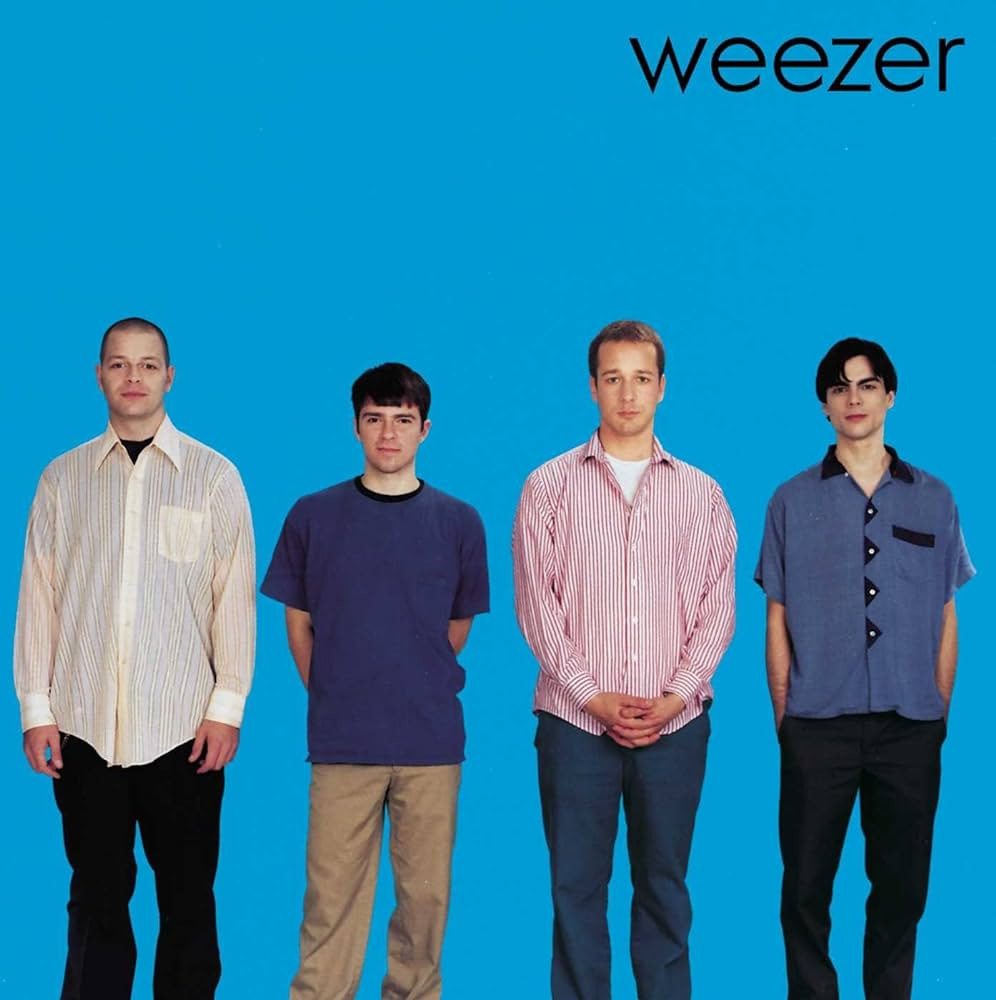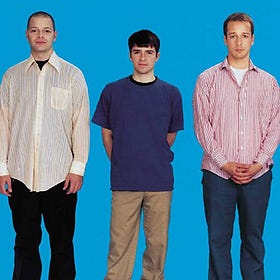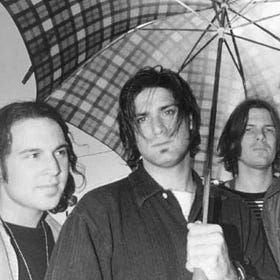'The Geeks Shall Inherit The Earth' (Part 1)
Lost Alternative Pop Gems From Hollywood In The '90s & Early 2000s
There wasn’t an easy way to categorize Weezer when DGC Records released their self-titled debut in May 1994.
The album artwork features the band members—Pat Wilson, Rivers Cuomo, Matt Sharp and Brian Bell—awkwardly posed like four aloof indie record store clerks in front of a plain blue backdrop. It stands in stark contrast to cooler covers that year like Green Day’s Dookie, The Offspring’s Smash or Oasis’ Definitely Maybe.
Beyond the striking artwork, the music was so undeniably great that a few forward-thinking critics and radio programmers took notice before two Spike Jones videos for “Undone” and “Buddy Holly” turned them into multi-platinum MTV darlings.
But what to call these Beach Boys/Pixies/Nirvana-influenced songs featuring killer hooks, crunchy guitars and confessional lyrics about destroyed sweaters, Dungeons & Dragons, and bottles that are ready to blow?
Among the early reviews/interviews in major publications was Chris Nashawaty’s Entertainment Weekly article, “The Geeks Shall Inherit The Earth”:
Weezer? The name conjures up images of high school losers with runny noses and head colds, not MTV's hottest new Buzz band. But with the out-of-nowhere success of "Undone—The Sweater Song" that’s exactly what the L.A. foursome has become. Don’t think they’re not recovering geeks, though.
That article is often cited as laying the groundwork for a ‘90s alternative rock sub-genre called ‘Geek Rock’ (also referred to as ‘Nerd Rock,’ among other variations). Although the term had previously been used to describe everybody from Frank Zappa and Elvis Costello to They Might Be Giants, it really stuck to Weezer.
It then followed Sharp’s spinoff band The Rentals before getting applied to disparate ‘90s rock acts including PUSA, Nada Surf, Fountains of Wayne, and others. Not all the bands tagged as ‘Geek Rock’ embraced it (Santa Barbara’s Nerf Herder being a notable exception), but it’s hard to deny the influence Weezer’s sound, look and anti-rockist aesthetic has had on rock music over the last three decades.
That influence was most immediate in 1990s Hollywood.
The late ‘80s implosion of the Sunset Strip hair metal that once dominated the local scene left the musical landscape wide open. Seemingly overnight, art-damaged funk/punk/metal hybrids like Fishbone, Red Hot Chili Peppers, Celebrity Skin and Janes Addiction were topping bills at Hollywood venues and occasionally breaking out nationally.
Once grunge, pop punk and alternative rock went mainstream in the early ‘90s, local music burst into vibrant micro-scenes that stretched from Santa Monica to East LA, the Valley to the South Bay, and beyond. Among them was a Hollywood Geek Rock contingent largely inspired by The Blue Album and Return of the Rentals (featuring Weezer’s Sharp and Wilson along with members of That Dog and Supersport 2000).
Some of those bands and musicians came up in the clubs alongside Weezer. Others simply took cues from Weezer’s songwriting, sound, look or approach to create something of their own. Many signed record deals and a few went on to have long careers (including Kara’s Flowers who morphed into Maroon 5), but most never made a mark beyond Hollywood.
My band Ridel High was an early part of that scene, so I can tell you first hand how amazing it was.
It seemed like we were out every night of the week back then:
Rehearsing, writing songs, and recording demos
Sharing bills or supporting our friends’ bands at clubs like The Whisky, Martini Lounge, Hell’s Gate/Goldfinger’s and Jack’s Sugar Shack
At annual festivals like Poptopia and, later on, International Pop Overthrow
Trading shows with bands in Orange County, the LA satellite scene up in Santa Barbara, as well as San Diego and San Francisco
Like a lot of our peers, Ridel High eventually signed to a major label but the album fell flat as A&M Records self-destructed. (It’s worth noting that Ridel High’s “Self Destructive” video was directed by Jerry Casale, bassist for Devo, another band sometimes tagged as “Geek Rock” during their career. ). Ridel High eventually got dropped and broke up, all three members going on to form/join other LA bands.
A few more successful acts that got their start in the Hollywood Geek Rock scene in the ‘90s and early 2000s include Nerf Herder (they probably played in Hollywood more than their hometown back then), Linus of Hollywood, Ozma, Phantom Planet and AM Radio, among others.
The Blue Album turns 30 this year, so I’ve spent a lot of time revisiting music that came out of the ‘90 Hollywood Geek Rock scene. Here are a few of those songs you might have missed, or want to revisit.
What’s your fav track below? Join the conversation in the comments.
Lost Gems From The ‘90s Hollywood Geek Rock Scene
Is Weezer Power Pop?
Weezer’s self-titled debut album—known affectionately as the Blue Album by generations of fans—turned 29 this month. To celebrate, Paul Myers and I wanted to share Daniel Brummel’s excellent exploration of these 10 legendary tracks through a power pop lens. This essay originally appeared in
Off To A Bad Start
Keith Brown profoundly changed my life twice. The first time was when we met during a high school English class in Manhattan Beach, CA. We immediately bonded over music and started The Hoods, our First Ser…







Thanks for sharing these - had never heard any of them.